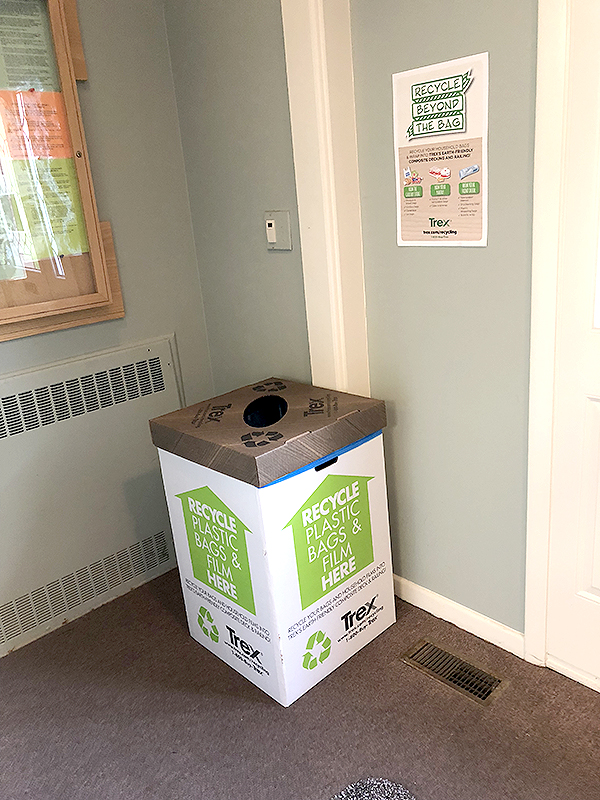Submitted By Kim Diamond
How do you turn 500 pounds of thin film plastic garbage into a high-performance park bench for one of our schools or parks? By participating in the Trex Thin Film Plastics Recycling Challenge (“Trex Challenge”). The Berkeley Heights Environmental Commission invites all residents to participate in this Trex Challenge, which began on June 2 and will run until December 1, 2018.
“Thin film plastics” are everyday items that generally fall into the following three categories:
(1) From the Grocery Store
● Produce bags
● Bread bags
● Grocery bags
● Cereal box bags
● Ice bags
(2) From Your Pantry
● Ziploc and other re-sealable bags
● Plastic wrap
● Case overwrap (e.g., the plastic covering over a case of soup cans, toilet paper, paper towels, napkins, water bottles, etc.)
(3) From Your Front Door (and Other Stores)
● Newspaper sleeves
● Dry cleaning bags/plastic wrap
● Plastic bags from clothing or other stores
● Bubble wrap
● Clear plastic wrapping around stationary boxes or other boxes
All of these items are acceptable for Trex Challenge purposes. Trex, a company specializing in composite decking, furniture, and other eco-friendly products, will aggregate the thin film plastics collected and repurpose them to create an outdoor bench.
Trex Challenge Bins such as the one pictured are being stationed at various locations around town, including the police station on Park Avenue (outside the courtroom) and the library at its 110 Roosevelt Avenue location. If you have any of the above items, please drop them off in one of these bins. All items must be clean, dry, and free of food residue.
As background, plastic bags are problematic for the environment. Because they are made from ethylene, a byproduct of petroleum, plastic bags are very inexpensive. According to the Sierra Club, for every 430,000 gallons of oil, 100 million plastic bags can be produced. This is why the U.S. uses approximately 380 billion plastic bags annually, why cashiers often give customers plastic bags freely, and why consumers have individual stockpiles of plastic bags at home. Given their light weight, those plastic bags that don’t wind up in landfills often end up in storm drains and make their way out to sea, becoming marine debris and contributing to plastic waste in the world’s oceans. In fact, just recently, scientists discovered a plastic bag in the Mariana Trench in the Pacific Ocean, the deepest ocean trench on the planet – approximately 36,000 feet below sea level. Simply put, donating your thin film plastics will be a step forward in helping to keep our environment clean.
So, if you’re walking to the train station on your way to work, swing by the police station and drop off your plastic newspaper sleeve and plastic wrap from your freshly dry cleaned clothes. If you’re having a cookout, providing cases of bottled water at a sports event, or participating in an another event where thin film plastics are used, please collect them and drop them off in a Trex Challenge Bin. And, if you consume any groceries that came in a plastic bag – whether they are fruits, vegetables, breads, or cereals – please drop off your plastic bags at the library as you swing by to select your (or your kids’) summer reading materials. Help preserve the environment, and help our town to win this challenge!
For additional information about the Trex Challenge, please visit the Berkeley Heights Environmental Commission’s Facebook page. or the Trex website at trex.com/recycling/recycling-programs/.

(above) Be on the lookout for Trex Challenge bins around town, where you can deposit your thin film plastics to be made into a park bench.





